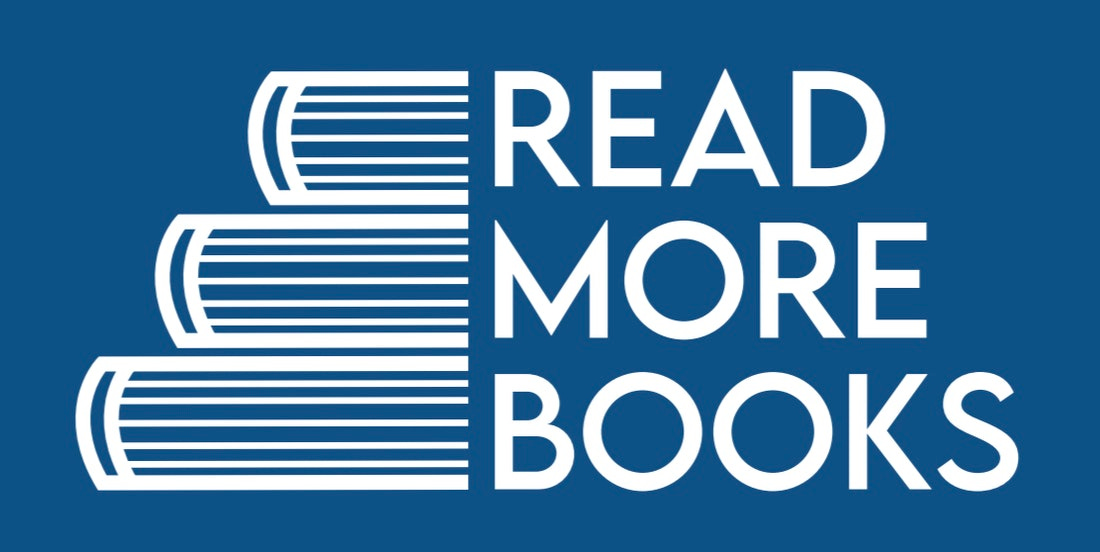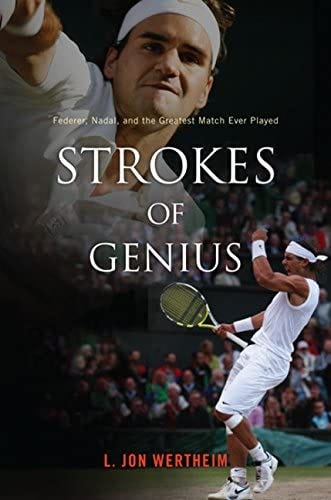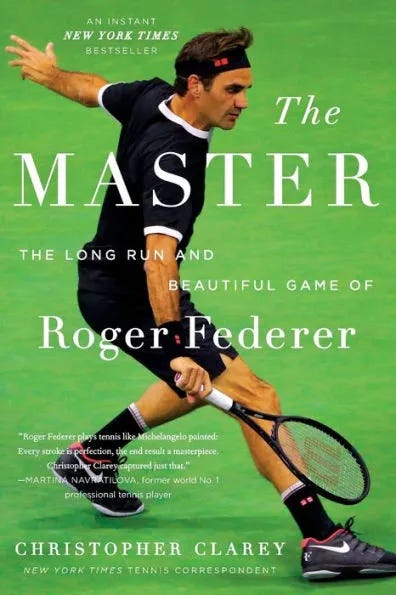What to Read Next (No. 248): 🎾 The Federer Edition 🎾
Happy Friday, readers!
Since Serena Williams and Roger Federer announced their retirements early this year, I’ve been bingeing tennis books. Though there aren’t as many Serena-focused books (yet!), there’s a few that highlight Federer’s particular genius on the court. (Here’s a few superb Serena profiles that are worth reading.)
I’ve read three of ‘em in the last handful of weeks and I’m excited to share these with you. Though you might think you need to be a big fan of tennis to enjoy these books, the truth is that if you’re interested in good writing and in a great narrative of mastering something you love, you’ll get a lot out of Federer’s story.
Don’t forget to join The Big Read — my online book club where we read classic books, together.
This month we’re digging into Frankenstein. In November and December we’ll be getting chilly with Alfred Lansing’s Endurance.
Strokes of Genius: Federer, Nadal, and the Greatest Match Ever Played by L. Jon Wertheim
The 2008 Wimbledon final, in which Rafael Nadal emerged on top after 5 hard-fought sets and nearly 5 hours on the court, is often considered the greatest tennis match of all-time.
Sports writer L. Jon Wertheim made that declaration almost right away, publishing Strokes of Genius just a year later in 2009. To make the reading experience even more powerful, I also re-watched the match on YouTube between chapters (each of the five sets is given a chapter).
What makes this famous battle so interesting as a story are the clashing polar opposites of Roger Federer and Rafael “Rafa” Nadal, who are likely to be remembered as two of the greatest players of all-time (GOAT status arguments will never reach a final conclusion).
Federer is the paragon of graceful tennis; Rafa’s personal logo is a bull. Federer loves the beauty of the game and considers the ball itself to be his primary competition; Rafa loves to beat people and wants to drive the ball through whoever’s on the other side of the net.
It was a true clash of titans. And Wertheim, amazingly, spends an entire book thoughtfully breaking down every aspect of the duel. He uses this particular match to get into broader aspects of tennis, too, like doping (or rather, the lack thereof in tennis), racket history and technology, the legacy of Wimbledon, and more.
Strokes of Genius is a short, incredibly accessible book which makes for perfect reading for anyone interested in sports or competition of any kind.
A Podcast Episode to Listen To
Last week, I was thrilled to appear on Evan Axelbank’s 100th episode of Axelbank Reports History and Today. He interviews some of the great historians of our era and always uncovers interesting nuggets of wisdom that you haven’t heard elsewhere.
For this episode, Evan hosted a roundtable discussion with Steve Floyd (whose been a big influence on my own newsletter!), Alycia Asai (whose podcast I thoroughly enjoy!), and myself. We all had great fun talking about history, books, and all kinds of other things. Give it a listen:
The Master: The Long Run and Beautiful Game of Roger Federer by Christopher Clarey
When it comes to sports greatness, we’ve come to enjoy and expect a dramatic story of single-minded devotion from the earliest days of childhood. Roger Federer breaks that mold. In many ways, his story is boring compared to a lot of others. There wasn’t much to overcome (besides, of course, the astronomical odds of becoming a professional athlete) and there hasn’t been any drama in his decades of greatness.
Above all, this book made two things about Federer abundantly clear: 1) his unbroken run at number one in the sport from 2004 to 2008 is unrivaled and remains one of the most dominant four-year periods in all of sports history, and 2) his longevity and (relative) lack of major injuries speaks to his mastery of the sport, and his body, more than just about any other facet of his game.
This book was more about the intricacies of tennis than the other two, and it was a touch long, which means The Master is probably less appealing to readers who aren’t much interested in tennis. If you’re a fan of the game, however, this one might just be the most impactful and enjoyable.
String Theory: David Foster Wallace on Tennis by David Foster Wallace
This is the first time I’ve read Wallace’s work at length. As a book reviewer, I’ve come across his writing at various times over the years but I’ve never actually cared to tackle the likes of doorstoppers Infinite Jest or The Pale King. When I found out that his tennis essays were collected in book form, though, I knew I had to give that a shot.
The five essays were written over the course of a dozen years or so. Even a few weeks later, I can vividly recall the subject of each. I linked to each of them, which can all be found online; no need to buy/borrow the book if you don’t want!
DFW’s experience growing up in the windy cornfields of Illinois while becoming a very good youth tennis player (PDF link)
A scathing review of Tracy Austin’s memoir and the athlete memoir genre of books as a whole; he really digs deep into what makes these titles so (nearly) universally terrible (PDF link)
General observations about the U.S. Open, especially zoomed in on the commercial aspect of it — that is, there are ads everywhere (PDF link)
A masterful profile of Michael Joyce, who never cracked the Top 50 — the point being how insanely good professional tennis players are, even if you’ve never heard of them (Esquire link)
A lyrical profile of Roger Federer that’ll make you appreciate his greatness even more — especially because it was written in 2006, which was relatively early in Federer’s career (New York Times link)
It’s incredibly easy to see why each of these essays are now considered among the greatest pieces of tennis writing ever penned.
Wallace’s writing is almost exactly what I expected: wordy, often pretentious, sometimes head-scratching . . . and also utterly brilliant. I rolled my eyes plenty (he obviously thinks highly of himself), but also muttered “My goodness, how did he do that?” numerous times while reading.
This is a great entry point into Wallace’s writing, in my opinion. You don’t really even need to be a fan of tennis — he’ll convert you with String Theory.
Quick note if you decide to read this one: Oddly, the print version of this booked is called String Theory, but the ebook and audio versions are titled On Tennis.
That’s all for me this week! Thanks so much for the time and inbox space — I sure appreciate it.
-Jeremy





If you're still on the tennis book kick, I recall reading Andre Agassi's _Open_ when it first came out 12 or 13 years ago and liking it a lot. Of course, I had grown up a huge Agassi fan, so it was basically designed for me. It's a memoir and so would likely have a different feel from the books on Federer and Nadal.